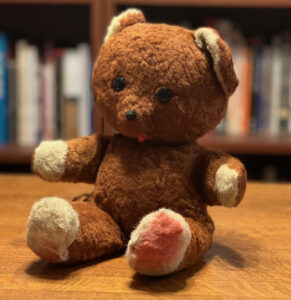
Photo by John Griswold
A teddy bear without a name feels like bastardy; obviously that does not preclude a royal heart. My old teddy bear is wrapped in tissue paper and tucked safely in a shoebox—an impromptu vessel, like Queequeg’s coffin, that has sailed through the decades and delivered its occupant safely to many new lands. I found the box recently in a closet, and when I opened it I realized I had no memory of what I called him. That was troubling.
I had muscle memories of lying with him through sweaty summer naps and sharing my plans in forts under tables, desks, the kitchen sink. This was the bear that comforted me, age three, after my older sister sat me in front of a TV, gave me a spoon and a giant bowl of cold mashed potatoes, and told me it was ice cream.
This was the bear I ran to, age four, after I had gotten out of the tub, strolled into my sister’s room, shaken my naked butt at her, and taken off down the hallway when she shouted, Get out get out get out! and slammed her door so hard the house shook.
A man needs the right companion with the right name for such adventures. I put the itchy little bear with innocent eyes and a tongue stuck out permanently in mischief on my chest as I looked up the company that made him. Rushton, in Atlanta, was female-owned and in business from 1917 to 1983. He was about the most elegant toy they made but was not expensive. Something I did at some point stained his feet pink, like he had been stomping grapes.
Thinking my emotional energy and whispered words might still be trapped in his stuffing, I called a super-empath to see if she could tell me his name. She said Edward was dignified, maybe it was Edward. Maybe Henry, like the kings. She thought it would be something more fluffy than regal, though. Maybe a nickname that was less formal, softer. I had some sudden sense of recognition that his name was Harry. That sounded right and pleased me that it would have been my earliest pun. Whether correct or not, it meant something now, if only that my imagination was shaped by who we were then together.
